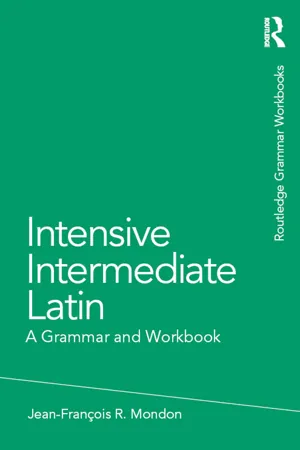
- 358 pages
- English
- ePUB (mobile friendly)
- Available on iOS & Android
About this book
Intensive Intermediate Latin: A Grammar and Workbook comprises an accessible grammar and related exercises in a single volume. It outlines every major grammatical point usually taught in an intermediate college Latin course, as well as other grammatical topics which may be introduced in the first semester of reading prose or poetry.
Features include:
- Careful management and repetition of vocabulary used to encourage sole focus on the grammar
- A variety of exercises to enable students to recognize and isolate the grammatical structures in English, helping them to translate into Latin with greater ease
- Frequent Latin to English and full English to Latin translations
- Exercises requiring students to modify aspects of Latin sentences in order to enable improved grammar acquisition
Written by an experienced instructor, Intensive Intermadiate Latin: A Grammar and Workbook is an ideal resource for students who want to build on their foundations of Latin. The title can be used as a textbook, grammar reference and practice resource for students and independent learners with some knowledge of the language.
Intensive Intermediate Latin, with its sister volume Basic Latin, forms a compendium of essentials of Latin grammar.
Frequently asked questions
- Essential is ideal for learners and professionals who enjoy exploring a wide range of subjects. Access the Essential Library with 800,000+ trusted titles and best-sellers across business, personal growth, and the humanities. Includes unlimited reading time and Standard Read Aloud voice.
- Complete: Perfect for advanced learners and researchers needing full, unrestricted access. Unlock 1.4M+ books across hundreds of subjects, including academic and specialized titles. The Complete Plan also includes advanced features like Premium Read Aloud and Research Assistant.
Please note we cannot support devices running on iOS 13 and Android 7 or earlier. Learn more about using the app.
Information




Present | Imperfect | Future |
mīror I admire | mīrābar I was admiring | mīrābor I will admire |
mīrāris you admire | mīrābāris you were admiring | mīrāberis you will admire |
mīrātur s/he, it admires | mīrābātur s/he, it was admiring | mīrābitur s/he, it will admire |
mīrāmur we admire | mīrābāmur we were admiring | mīrābimur we will admire |
mīrāminī you admire | mīrābāminī you were admiring | mīrābiminī you will admire |
mīrantur they admire | mīrābantur they were admiring | mīrabuntur they will admire |
Perfect | Pluperfect |
mīrātus (-a, -um) sum I admired | mīrātus (-a, -um) eram I had admired |
mīrātus (-a, -um) es you admired | mīrātus (-a, -um) erās you had admired |
mīrātus (-a, -um) est s/he, it admired | mīrātus (-a, -um) erat s/he, it had admired |
mīrātī (-ae, -a) sumus we admired | mīrātī (-ae, -a) erāmus we had admired |
mīrātī (-ae, -a) estis you admired | mīrātī (-ae, -a) erātis you had admired |
mīrātī (-ae, -a) sunt they admired | mīrātī (-ae, -a) erant they had admired |
Future perfect |
mīrātus (-a, -um) erō I will have admired |
mīrātus (-a, -um) eris you will have admired |
mīrātus (-a, -um) erit s/he, it will have admired |
mīrātī (-ae, -a) erimus we will have admired |
mīrātī (-ae, -a) eritis you will have admired |
mīrātī (-ae, -a) erunt they will have admired |
Table of contents
- Cover
- Half Title
- Title Page
- Copyright Page
- Dedication
- Table of Contents
- Introduction
- Latin sources
- 1 Deponent verbs
- 2 Fīō
- 3 Infinitives
- 4 Indirect statement
- 5 Present and imperfect subjunctives
- 6 Subjunctive of irregular verbs
- 7 Purpose clauses
- 8 Indirect commands
- 9 Perfect and pluperfect subjunctives
- 10 Sequence of tenses
- 11 Indirect questions
- 12 Potential and optative subjunctives
- 13 Result clauses I
- 14 Result clauses II
- 15 Quod substantive clauses
- 16 Impersonal verbs
- 17 Indirect reflexives
- 18 Hortatory and jussive subjunctives
- 19 Causal clauses
- 20 Concessive clauses
- 21 Temporal clauses I – when(ever)
- 22 Temporal clauses II – before and after
- 23 Dum clauses
- 24 Conditional sentences
- 25 Doubting clauses
- 26 Fearing clauses
- 27 Clauses of prevention
- 28 Gerunds
- 29 Gerundives
- 30 Periphrastics
- 31 Fore
- 32 Supine
- 33 Subjunctive by attraction
- 34 Syncopated verbal forms
- 35 Numerals
- 36 Greek nouns
- 37 Meter I: weight and feet
- 38 Meter II: elision and synizesis
- 39 Archaic Latin
- 40 Late Latin
- Key to exercises
- Dictionaries